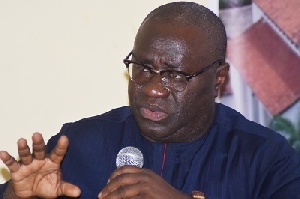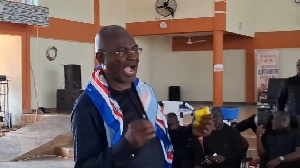- Home - Entertainment
- Lifestyle News
- Year In Review
- Music News
- Entertainers
- Entertainment Archive
- Entertainment Photos
- Jokes
- Entertainment Headlines
- Ameyaw Debrah
- Brown GH
- Celebrities Buzz
- GH Base
- Ghana Celebrities
- Gh Gossip
- GH Page
- GH Splash
- Hot Gossip GH
- YEN
Television of Tuesday, 15 April 2025
Source: www.ghanawebbers.com
Bawku conflict has shifted from factions and chieftaincy to organised crime – Prof Aning
Security consultant Prof. Kwesi Aning has discussed the conflict in Bawku. He stated that it has evolved beyond ethnic tensions and chieftaincy disputes. Now, it is mainly driven by organized crime and a transnational network.
During an appearance on the JoyNews AM Show, he explained that violence has persisted for years. Initially sparked by ethnic tensions and leadership struggles, it is now fueled by criminal activity.
Prof. Aning emphasized that the situation in Bawku is more complex than many realize. He noted that people often see it as a conflict between two groups. However, he believes it has gone beyond these two groups and chieftaincy issues.
He highlighted that criminal networks are the real force behind ongoing violence. These groups exploit existing ethnic and traditional leadership tensions in the region.
“What we are witnessing in Bawku today is driven more by criminality,” Prof. Aning said. He added that these networks use ethnicity and long-standing suspicions to further their agendas.
While he did not provide sensitive details about the criminal groups involved, he stressed the complexity of the conflict. “I cannot delve too much into this due to my public office,” he explained.
Prof. Aning criticized the common narrative framing the conflict as merely ethnic or chieftaincy-related. He warned that this oversimplification could worsen the violence.
“The argument that it is simply an ethnic or chieftaincy issue is false,” he stated. This view does not help and may exacerbate already high tensions.
The professor pointed out the government's struggle to effectively address the crisis. He cited a lack of resources and strategic planning as major obstacles.
“I can assure you that the situation is delicate,” he said, warning of a potential scorched-earth policy. Without necessary resources or strong foundations, resolving this issue will be difficult.
He concluded with a stark assessment of government capabilities: “We cannot calm the conflict.” He reiterated, “We don’t have the resources; we don’t have the backbone.”











